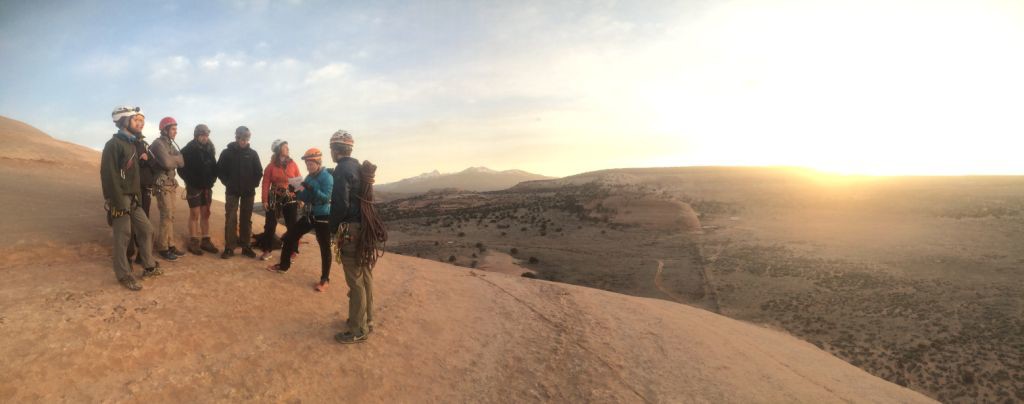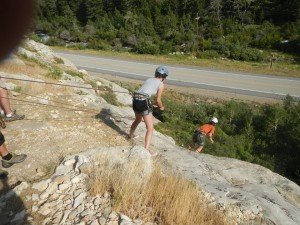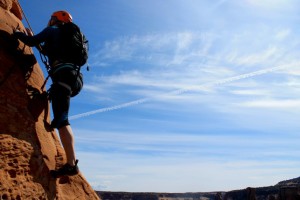Faith on the Edge of a Cliff – Thoughts of a Wyoming Catholic College Student – Episode 3
Last month in my blog series on my journey to Wyoming Catholic College, I explained the purpose and benefit of a Great Books curriculum. This month, I offer a reflection on WCC’s outdoor program—one of the school’s most distinctive and essential elements.
Three years ago my family took a vacation to Yellowstone Park. That was one my first times out West, and the first time I’d been to Wyoming. During the road trip and our hikes through the park, I found myself stunned by the beauty of the land—a pristine, craggy, wild kind of beauty, totally new to my Chicago-suburb eyes. In short, I fell in love. On our last day in Yellowstone, this is what I wrote in my journal:
“Once God’s finger touched this land, and the earth still sings and trembles with that glory. It sings of open grass, of tumbled rocks and sagebrush, in thin gold-green tones as high as wind. It sings of rivers, lazy and brilliant among the meadows, rushing and deep foam-flecked green between the cliffs, in strains strong and ever-flowing. It sings of pines and pine-shadows with somber, tall, fragrant, mysterious notes. And last but reaching above all else is the song of the mountains—keen, stirring, cragged and snow-capped, draped in the pines and calling…calling in their great deep voices, stern and irresistible as distant bells. Tolling out a fell and beautiful song…this, this, this is the voice of the land. It is a song you must hear with all your being. So hear the song, and sing back a hymn, to complete the harmony of Creation, and its Supreme God.”
Little did I suspect that I would be returning to Wyoming for four years of college!
The mountains and rivers are an integral part of the curriculum at Wyoming Catholic College, just as much as the Great Books. Nature is “God’s First Book,” from which students learn the lessons of wonder, humility, and leadership. In fact, the freshman orientation is a 21-day backpacking trip in the Rocky Mountains.
Yes, it’s required. And yes, I am nervous. But more than that, I am looking forward to the challenge and the beauty and the experience. For I already know how well it works. Last year I attended a two-week summer program at the college, which included a weekend backpacking trip.
First of all, there’s nothing that tastes as good as a meal you’ve cooked yourself after hiking three or four (or more) miles on a rough mountain trail. And there aren’t many things cooler than standing around a bonfire under a starry summer sky in the middle of nowhere, singing folk songs and Gregorian chant with your friends.
To be serious, though, I had profound experiences of both wonder and humility during that summer camp. I found myself inspired, challenged, and changed—broken open, thrust into new horizons, discovering weaknesses I’d hidden and growing in new strengths. And that was just two weeks. Now I get to spend four years steeping myself in this life-changing beauty.
If I tried to list all the encounters with wonder I had during those weeks, this would be a very long blog post. Fortunately, I do have a favorite experience to share. One of the college chaplains came out with us on the weekend backpacking trip to celebrate Mass. Sunday morning found the forty of us kneeling on a massive rock which rose above the pines and the sagebrush, while the priest celebrated the liturgy from a boulder-turned-altar. The rock scraped my knees and the July sun glared in my eyes, but I felt more focused than I had during any of the Masses I’d attended in church that week. This rock was God’s altar, this brilliant sky His cathedral. I was saturated in delight and wonder.
My experiences of humility were not always as pleasant as my encounters with wonder, but they were equally valuable. I’m an introvert-perfectionist, so I hate acting stupid or admitting my flaws. But the wilderness exposes spiritual weaknesses just as it challenges physical ones. I will never forget the day my group went rappelling in Sinks Canyon. After teaching us the technique for traditional rappelling (climbing down a cliff backwards in a rope and harness), our instructors offered us the chance to try it “Australian style” (a.k.a., “defying every single human instinct relating to the law of gravity”).
I was either feeling very brave or very overconfident. I found myself walking down a cliff headfirst, with the harness pressing into my stomach so that I could barely breathe. More than once I panicked, slipped, and fell dangling against the cliff face. Only with the firm guidance of my ground team did I finally reach the bottom. I was exhausted, bruised, and rawly humiliated. But I was also extremely grateful for my ground team. I realized that if I relaxed and trusted my teachers and teammates, I could not only live through a terrifying experience like Australian rappelling, but I could also grow from it.
I have yet to learn leadership from WCC’s outdoor trips, but I will soon. At some point during the three weeks of the freshman orientation, I will be in charge of my group for at least one day—planning the route and making the decisions. The rest of the time, I’ll have to be a cooperative and active follower—which, for an introvert-perfectionist, may not always be easy, either!
The purpose of WCC’s freshman orientation, to my mind, is a sort of a baptism by fire. Right from the start, the students are challenged, thrust beyond their comfort zone, and taught the importance of virtue in a real-life situation. The lessons of wonder, humility, and leadership I’ll learn won’t be confined to the outdoors—I’ll bring them back to the classroom, my relationships, and my whole life.
I’ll see you in God’s country.





